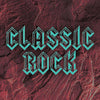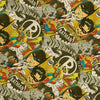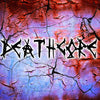Queen - Officially Licensed Merchandise
Queen, formed in London in 1970, became one of rock’s most versatile and celebrated bands, known for their musical diversity and theatrical flair. Fronted by the charismatic Freddie Mercury, with Brian May on guitar, John Deacon on bass, and Roger.... Show More Taylor on drums, Queen’s blend of rock, opera, and pop produced timeless hits like “Bohemian Rhapsody” and “We Will Rock You.” Mercury’s powerful voice and May’s distinctive guitar sound helped define Queen’s unique style, while their ability to connect with audiences made them live legends. Known for their musical innovation, Queen’s influence spans generations, making them one of the most enduring bands in rock history.
2. Sheer Heart Attack (1974) - Known for tracks like “Killer Queen” and “Stone Cold Crazy,” this album showcased Queen’s versatility and established them as rock innovators.
3. News of the World (1977) - With anthems like “We Will Rock You” and “We Are the Champions,” this album became a cultural phenomenon, connecting with audiences worldwide.
4. The Game (1980) - Featuring “Another One Bites the Dust” and “Crazy Little Thing Called Love,” this album marked a shift toward a more radio-friendly sound.
5. Innuendo (1991) - Known for its introspective tone and tracks like “The Show Must Go On,” this album was Queen’s final release before Freddie Mercury’s passing, showcasing their resilience and artistry.
Brian May (Guitar): With his custom-built “Red Special” guitar, May’s distinctive tone and intricate solos became a hallmark of Queen’s sound. His background in physics also contributed to the unique soundscapes Queen created.
John Deacon (Bass): Known for his melodic, precise bass lines, Deacon’s playing style added depth to Queen’s music. His songwriting contributions, including hits like “Another One Bites the Dust,” were crucial to Queen’s commercial success.
Roger Taylor (Drums, Vocals): Known for his powerful drumming and high harmonies, Taylor’s energetic style provided Queen with a dynamic rhythm. His songwriting and lead vocals on tracks like “I’m in Love with My Car” showcased his versatility.
Queen
2. Sheer Heart Attack (1974) - Known for tracks like “Killer Queen” and “Stone Cold Crazy,” this album showcased Queen’s versatility and established them as rock innovators.
3. News of the World (1977) - With anthems like “We Will Rock You” and “We Are the Champions,” this album became a cultural phenomenon, connecting with audiences worldwide.
4. The Game (1980) - Featuring “Another One Bites the Dust” and “Crazy Little Thing Called Love,” this album marked a shift toward a more radio-friendly sound.
5. Innuendo (1991) - Known for its introspective tone and tracks like “The Show Must Go On,” this album was Queen’s final release before Freddie Mercury’s passing, showcasing their resilience and artistry.
Brian May (Guitar): With his custom-built “Red Special” guitar, May’s distinctive tone and intricate solos became a hallmark of Queen’s sound. His background in physics also contributed to the unique soundscapes Queen created.
John Deacon (Bass): Known for his melodic, precise bass lines, Deacon’s playing style added depth to Queen’s music. His songwriting contributions, including hits like “Another One Bites the Dust,” were crucial to Queen’s commercial success.
Roger Taylor (Drums, Vocals): Known for his powerful drumming and high harmonies, Taylor’s energetic style provided Queen with a dynamic rhythm. His songwriting and lead vocals on tracks like “I’m in Love with My Car” showcased his versatility.
Oops! there are no products in this collection.
But check out our top trending products.
FEATURED GENRES
Queen, formed in London in 1970, became one of rock’s most versatile and celebrated bands, known for their musical diversity and theatrical flair. Fronted by the charismatic Freddie Mercury, with Brian May on guitar, John Deacon on bass, and Roger.... Show More Taylor on drums, Queen’s blend of rock, opera, and pop produced timeless hits like “Bohemian Rhapsody” and “We Will Rock You.” Mercury’s powerful voice and May’s distinctive guitar sound helped define Queen’s unique style, while their ability to connect with audiences made them live legends. Known for their musical innovation, Queen’s influence spans generations, making them one of the most enduring bands in rock history.
2. Sheer Heart Attack (1974) - Known for tracks like “Killer Queen” and “Stone Cold Crazy,” this album showcased Queen’s versatility and established them as rock innovators.
3. News of the World (1977) - With anthems like “We Will Rock You” and “We Are the Champions,” this album became a cultural phenomenon, connecting with audiences worldwide.
4. The Game (1980) - Featuring “Another One Bites the Dust” and “Crazy Little Thing Called Love,” this album marked a shift toward a more radio-friendly sound.
5. Innuendo (1991) - Known for its introspective tone and tracks like “The Show Must Go On,” this album was Queen’s final release before Freddie Mercury’s passing, showcasing their resilience and artistry.
Brian May (Guitar): With his custom-built “Red Special” guitar, May’s distinctive tone and intricate solos became a hallmark of Queen’s sound. His background in physics also contributed to the unique soundscapes Queen created.
John Deacon (Bass): Known for his melodic, precise bass lines, Deacon’s playing style added depth to Queen’s music. His songwriting contributions, including hits like “Another One Bites the Dust,” were crucial to Queen’s commercial success.
Roger Taylor (Drums, Vocals): Known for his powerful drumming and high harmonies, Taylor’s energetic style provided Queen with a dynamic rhythm. His songwriting and lead vocals on tracks like “I’m in Love with My Car” showcased his versatility.






































